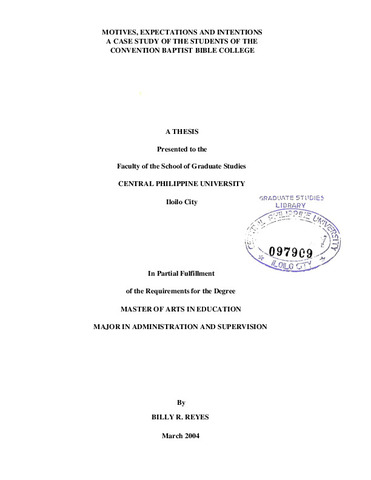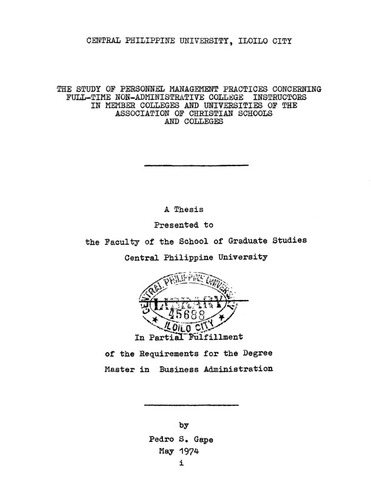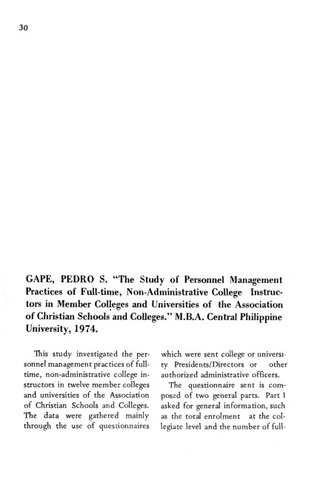Motives, expectations and intentions: A case study of the students of the Convention Baptist Bible College
摘要
This study was conducted to determine the characteristics of the students of the Convention of Baptist Bible College, Bacolod City, and their motives, expectations, and intentions when they enrolled at the college. Moreover, the study determined whether motives, expectations, and intentions, vary according to selected factors, such as, age, sex, educational attainment, household size, household income, number of years of involvement in the church, and the type of involvement.
This study is descriptive in nature. The data were collected in a self-administered questionnaire, written both in English and Ilonggo. In-depth personal interviews with the students were also conducted to generate qualitative information. Statistical analysis was done using the Statistical Package for the social Sciences (SPSS) 11.0 for Windows software and the Z values were derived using the Microsoft Excel 2000 for Windows.
Hypothesis of the Study
The following null hypotheses were tested at 0.05 level of significance:
1. The motives, expectations and intentions of CBBC students do not vary according to their personal characteristics such as age, sex, educational attainment, household income and household size.
2. The motives, expectations and intentions of CBBC students do not vary according to their church related characteristics like the number of years of involvement and type of involvement in the local church.
Major Findings
The majority of the students were from Negros Occidental, almost all of them were single, from rural areas, from poor and medium sized households, with parents who are farmers and/or farm workers, but most have attended college level education.
All of them had been involved for 4 years or more in the various ministries of the local church. Most were active leaders in two or more ministries. CBBC’s students had a male-female ratio of 1:1. Intrinsic factors were the dominating force in the student’s decision to enroll at CBBC. Almost all of them were sure that the Lord had called them to full-time ministry or had received personal prodding from the Lord. Of the extrinsic factors, CBBC’s excellent training has the greatest influence on their decision. The “pastor’s influence” was the weakest motivation for students in attendance at CBBC.
The motives to enroll at CBBC vary according to age, sex, household size, and household income, with respect only to the motives: family influence, peer influence, pastor’s influence, excellent training, and God’s prodding.
CBBC students expressed a very high expectation from the school. The greatest expectations of the students were ministry related and the least expectations they have were in terms of getting a subsidy from the college for school expenses and getting a good-paying job after graduation, or money related.
The expectations of the students of CBBC vary according sex, household income and the number of years of involvement in the church.
CBBC students have shown relatively low intentions after graduation. More of the younger students than older students planned to become a missionary. More female students planned to go back to their home church to serve as fulltime worker than male students. Students who have attained high school education intended more to get married and/or become a missionary than those who have attained college education. More students from households with fewer members intended to work in a para-church organization compared to students from households with more members.
The intentions of the students after graduation vary according to age, sex, educational attainment, and household size.
Conclusion
This study resulted in discovering the true state of the Convention Baptist Bible College and her students in terms of their personal and church related characteristics, as well as their motives for attending the Bible College, their expectations from the Bible College, and some of their intentions as they look forward to life after graduation.
1. CBBC continues to live up to its original purpose of training pastors for the barrios since a great majority of the students comes from the barrios. With almost all of the students coming from very poor families, CBBC also caters to the education and empowerment of the poor.
2. CBBC students were active in their local church for at least four years before they came to enroll at CBBC. The local church became like an avenue for them, or a stepping-stone in the pursuit of fulfilling God’s will for their lives.
3. Although almost all students had intrinsic motivation for attending the Bible College, a small group of students in attendance seemed to have indicated that they were unsure about their motives concerning God’s call and leading in their lives.
4. The students showed focus as they are being trained for the ministry. They have high ministry-related expectations. Every single one of them wanted to develop the skill in preaching and teaching, as if to say in effect, that they can’t do or succeed in the ministry without it. Nonetheless, another disturbing fact has emerged in that quite a sizeable number of students expected for a good paying job after graduation.
5. The students’ intentions reflect a variety of interests on their part, which are also ministry related. Most wanted to become missionaries, and/or get involved in campus ministries, and/or become a church planter, and/or get married. The home church is still the intended destination of more female students compared to the males. Still a sizeable number of students intended to look for a good paying job after graduation. In general, the students’ outlook about the future is relatively hazy.
6. The motives, expectations, and intentions of the students vary according to age, sex, educational attainment, household size, household income, as well as the length of years of exposure in the church. Only the type of involvement in the church has no bearing on the students’ motives, expectations, and intentions. In general, all the students showed almost the same kind and same amount of motives, expectations, and intentions.
7. Only the number of years of involvement of the students in their church has an effect as far as their motives, expectations, and intentions are concerned. The long involvement of the students in the life and activities of the local church prior to their enrollment at CBBC may have played the biggest factor in the high intrinsic nature of their motivation and the consensual nature of their expectations and intentions.
Recommendations
On the basis of these findings, the following items are recommended: 1.
1. The college should consider seriously the giant upswing in the urban population and establish a module for urban ministry training. It should also commit herself for increased student support by looking into probable support from foundations and/or organizations that help fund the education/training of the poor. It should create an “office for development” to handle the recruitment, fundraising, communications, and student support services, which include, guidance and counseling, motivation, scholarship, etc.
2. CBBC should be wise to focus her recruitment among the churches of the CPBC, particularly, in Negros Occidental. However, the school should increase its efforts recruiting for future urban pastors/workers from among the city churches.
3. CBBC should prepare a checklist to be filled out by all students to help identify their motives, expectations, intentions, and needs of the applicants. This should be xx followed by the writing of their personal testimony. The school should then go beyond determining the motives, etc. of the students by establishing in-house motivational programs making use of every available resource, style and medium. A study on why the pastors are hardly making an influence in the lives of especially the young people in the church should be done to address the issue.
4. The training program of CBBC must be tailored to meet the expectations and intentions of the students. The training modules should include all or a combination of any of the following: classroom instructions, field exposure and practicum, book reports, video watching and analysis, situational analysis, survey and analysis, one-on-one mentoring, journal and report writing. The urban area must be a part of the student field exposure program.
5. CBBC must help the students in defining their life’s goals/intentions as early as their first year. The potential problem of having money-related intentions should be dealt with individually and corporately through one-on-one discussions and seminars.
6. CBBC should conduct a further study on the following: 1) motives, expectations, and intentions of students and pastors who dropped out and find out the actual reason/s why they did so; and 2) students’ study habits, the motivations for their study, the measure of their study discipline, the factors that affect their study, and what is needed to enhance their study habits.
7. The school should take a careful review and overhaul of its recruitment program. The breakdown of respondents by origin has been consistent with past school records. It is recommended that about 80 percent of the school’s efforts and xxi recruitment activities should also be focused around the province of Negros Occidental, including the Summer Gospel Team outreach. However, without neglecting the other provinces of the country, the school must plan for a very creative recruitment strategy designed for the outlying areas with the cooperation of CBBC graduate-pastors and making use of every available resources, such as, scholarship/sponsorship, visitation, etc.
描述
Abstract only
建议引文
Reyes, B. R. (2004). Motives, expectations and intentions: A case study of the students of the Convention Baptist Bible College (Unpublished Master's thesis). Central Philippine University, Jaro, Iloilo City.
文件类型
Thesis主题
部
School of Graduate Studies学位
Master of Arts in Education major in Educational Administration and Supervision货架位置
GSL Theses 378.242 R33
物理描述
xxi, 116 leaves
相關項目
顯示由標題,作者,創造者和主題相關的項目。
-
Level of integration into university life among Social Sciences students coming from rural areas
Betito, Jovy Lyn B.; Cerbas, Kurt Jason D.; Javil, Mary Janine B.; Pueyo, April Joy V.; Suerte, Blessy G.; Ermitaño, Jade S. (Central Philippine University, 2024-04)The study, "Level of Integration Into University Life Among Social Sciences Students Coming From Rural Areas," utilized a descriptive quantitative method to assess integration levels among respondents from rural areas ... -
The study of personnel management practices concerning full-time non-administrative college instructors in member colleges and universities of the Association of Christian Schools and Colleges
Gape, Pedro S. (1974)Introduction It is generally assumed that the success or failure of any human pursuit depends on the type of personnel who perform the assigned tasks necessary to the accomplishment of the desired objective. This is true ... -
The study of personnel management practices of full-time, non-administrative college instructors in member colleges and universities of the Association of Christian Schools and Colleges
Gape, Pedro S. (Central Philippine University, 1974)This study investigated the personnel management practices of full time, non-administrative college instructors in twelve member colleges and universities of the Association of Christian Schools and Colleges. The data were ...





